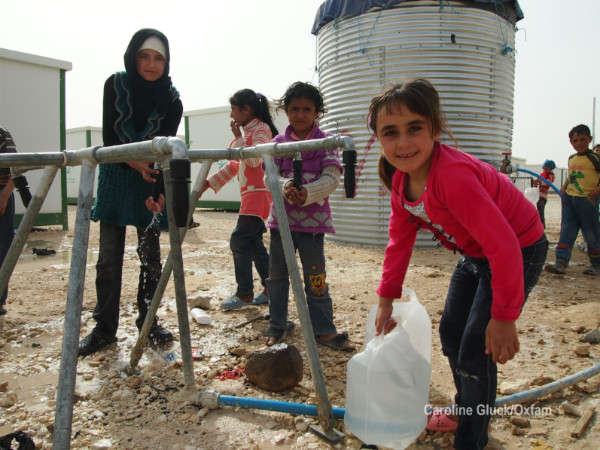
Promoting evidence-informed emergency WASH responses

Context
With the number of humanitarian crises growing, there is an urgent need to address WASH concerns arising from conflicts, disasters and disease outbreaks. Humanitarian responders use WASH interventions to reduce the risk of disease. However, evidence of which WASH interventions work in such emergencies is limited.
A 3ie-supported review identified 106 WASH evaluations in 39 countries, testing 13 categories of WASH interventions commonly used in emergencies, including water source treatments, household water treatment, sanitation, hygiene promotion and environmental hygiene. The review focused on quantitative and qualitative studies of populations affected by an emergency in a low- or middle-income country published during 1995–2016.
Evidence
The authors found that water dispensers and water treatment for households, as well as latrines and hygiene promotion, were effective at the recipient level. However, pumping wells flooded with seawater was not effective in reducing salinity. The review concluded that there was limited evidence that WASH interventions reduce disease risk, and that communities overestimated the impacts of some interventions, such as household spraying and well disinfection.
Twelve of the 13 categories of interventions were found to be effective, but the authors emphasised that pre-existing socio-cultural conditions and context matter for the real-world effectiveness of WASH interventions. They identified factors such as preferences around taste and smell, trust or fear of implementers, a tendency to overestimate effectiveness and ease of use as affecting the effectiveness of interventions. Approaches that aided intervention success included disseminating simple messages through multiple communication modes, timing interventions carefully, and encouraging community involvement.
The authors found that some commonly implemented emergency WASH interventions, such as bucket chlorination, bulk water treatment, handwashing, household spraying, water trucking and environmental clean-up, had rarely been studied. They found that additional evidence is needed for these interventions, as well as formal economic analysis of all emergency WASH interventions.
Evidence impacts
Type of impact: Inform global guidelines and policy discussions
When findings from an evaluation or review can be traced to discussions or actions. Examples include governments or multilateral or bilateral donors’ mentioning the findings to inform policy or programming. To date, we have only one case of an individual impact evaluation informing global health guidelines. WHO guidelines require that the guidance is based on randomised evaluation evidence.
This is one of 3ie’s seven types of evidence use. Impact types are based on what we find in the monitoring data for an evaluation or review. Due to the nature of evidence-informed decision-making and action, 3ie looks for verifiable contributions that our evidence makes, not attribution.
Read our complete evidence impact typology and verification approach here.
Close windowThe review’s search documents informed a related review focused on interventions responding to disease outbreaks, funded by Oxfam GB’s Humanitarian Evidence Programme. Both the reviews have informed a global priority-setting exercise for research into WASH interventions in emergency settings, as well as evaluations funded by the Research for Health in Humanitarian Crises group. This group includes humanitarian responders and research agencies, such as the United States Office of Foreign Disaster Assistance, Save the Children UK, Médecins Sans Frontières, UNICEF, Oxfam GB, the US Centers for Disease Control and Prevention, and the London School of Hygiene and Tropical Medicine.
The multi-stakeholder Global Handwashing Partnership’s Hygiene in Emergencies learning resource for practitioners cites the 3ie-supported review in order to highlight the importance of context.
Type of impact: Inform the design of other programs
Where findings from the evaluation or review inform the design of a program(s) other than the one(s) evaluated.
This is one of 3ie’s seven types of evidence use. Impact types are based on what we find in the monitoring data for an evaluation or review. Due to the nature of evidence-informed decision-making and action, 3ie looks for verifiable contributions that our evidence makes, not attribution.
Read our complete evidence impact typology and verification approach here.
Close windowThe review finding that commonly implemented WASH interventions, such as hygiene kits, were severely under-researched prompted a US-based alliance called Partnership for Quality Medical Donations to launch a new programme supporting best practice in hygiene kits distribution, with funding from donors such as Johnson & Johnson. Daniele Lantagne, one of the authors of the review, is leading research into improving hygiene kits as a sub-grantee.
Type of impact: Inform discussions of policies and programs
When subsequent phases of the evaluated programme or policy draw from the findings of the evaluation or review, and/or the study team participates in informing the design of a subsequent phase.
This is one of 3ie’s seven types of evidence use. Impact types are based on what we find in the monitoring data for an evaluation or review. Due to the nature of evidence-informed decision-making and action, 3ie looks for verifiable contributions that our evidence makes, not attribution.
Read our complete evidence impact typology and verification approach here.
Close windowMentioned in rapid review on solid water and fecal sludge management (Type: Inform discussions of policies and programmes)
The 3ie-funded review has been cited in a Knowledge for Development rapid review on solid waste and fecal sludge management produced by the UK Institute of Development Studies. K4D reviews are “helpdesk reviews” commissioned by the UK government’s Department for International Development.
Suggested citation
International Initiative for Impact Evaluation (3ie), 2020. Promoting evidence-informed emergency WASH responses [online summary], Evidence Impact Summaries. New Delhi: 3ie.
Evidence impact summaries aim to demonstrate and encourage the use of evidence to inform programming and policymaking. These reflect the information available to 3ie at the time of posting. Since several factors influence policymaking, the summaries highlight contributions of evidence rather than endorsing a policy or decision or claiming that it can be attributed solely to evidence. If you have any suggestions or updates to improve this summary, please write to influence@3ieimpact.org